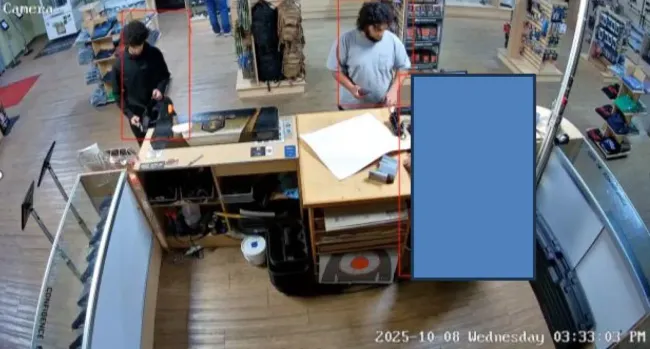How Mohmed Ali and Majed Mahmoud’s ISIS-Inspired Halloween Attack on Michigan LGBTQ+ Bars Was Stopped by the FBI
Federal agents foiled a chilling Halloween terror plot allegedly planned by Mohmed Ali and Majed Mahmoud, two 20-year-old Dearborn men accused of preparing a Paris-style ISIS-inspired massacre targeting LGBTQ+ bars near Detroit.
The Halloween Bloodbath That Never Happened
Halloween 2025 could have turned into one of the deadliest nights in Michigan history. Federal prosecutors have exposed a shocking ISIS-inspired plot allegedly led by Mohmed Ali and Majed Mahmoud, both 20-year-old residents of Dearborn, who now face federal terrorism charges for conspiring to launch a mass shooting modeled after the 2015 Paris attacks that killed 130 people.
According to investigators, their mission—codenamed “Pumpkin”—was designed to unleash horror across LGBTQ+ nightlife venues in suburban Detroit. The plan was detailed, armed, and terrifyingly close to execution—until the FBI intervened just in time.
Inside the “Pumpkin” Conspiracy
In a 72-page criminal complaint, prosecutors revealed how Ali and Mahmoud meticulously plotted the attack.
They weren’t just fantasizing about violence—they were preparing to carry it out.
Intercepted messages show Ali’s grim determination:
“I gotta do the pumpkin for real… if I don’t do the pumpkin, I’m gonna slit my wrists.”
The “Pumpkin” codename symbolized their Halloween timeline, and the men allegedly discussed how to maximize casualties in a night of chaos.
Scouting LGBTQ+ Bars in Ferndale
In September, the pair drove to Ferndale, a Detroit suburb known for its thriving LGBTQ+ community, to identify possible targets. They surveyed three bars along Woodward Avenue, all described in court documents as venues “that deliberately attract members of the LGBTQ+ community.”
FBI investigators tracked their movements through cell phone location data, confirming several scouting trips made under the guise of ordinary outings.
Building an Arsenal for Mass Murder
Despite their young age, Ali and Mahmoud managed to legally purchase and stockpile a deadly cache of weapons, including:
- Three AR-15-style rifles
- One shotgun
- Four handguns
- Over 1,600 rounds of ammunition
- Forced-reset triggers to boost firing speed
- Tactical vests, GoPro cameras, and multiple magazines
When FBI agents raided their homes and an Inkster storage unit, they discovered what one agent described as a “fully assembled killing kit” ready for use.
Training for a Halloween Massacre
Surveillance videos revealed that Ali and Mahmoud spent weeks practicing at Detroit-area shooting ranges between September and October. Investigators say these weren’t recreational sessions—they were combat-style drills, complete with tactical gear and target practice to simulate a real-life assault.
Inspired by Paris, Dreaming of Orlando
Court records show the duo repeatedly referenced major terrorist attacks, including the 2015 Paris ISIS assault and the 2016 Pulse nightclub massacre in Orlando, which specifically targeted LGBTQ+ victims.
They allegedly vowed to “do the same thing as France,” and their conversations were saturated with ISIS propaganda and extremist rhetoric encouraging martyrdom and violence.
A Wider Web of Extremism
The “Pumpkin” plot wasn’t limited to Ali and Mahmoud.
The FBI identified five unnamed co-conspirators, including a minor labeled as “Person 1.” This minor was reportedly assigned to carry out part of the attack alongside Ali, while other members discussed fleeing to Syria to join ISIS after the bloodshed.
The conspirators communicated through encrypted apps like WhatsApp, calling themselves “brothers” and trading ISIS videos and instructions for urban attacks.
How the FBI Dismantled the Plot
Federal agents began tracking the group months before Halloween 2025 through undercover surveillance and informants. An FBI insider joined the group’s encrypted chats, recording their discussions about weapons, attack dates, and reconnaissance missions.
When the arrests were announced, FBI Director Kash Patel stated:
“The FBI prevented a massacre before it could unfold. Two men from Michigan were plotting an ISIS-inspired Halloween attack near Detroit—stockpiling weapons, scouting bars, and training for mass murder. Our agents acted decisively and saved lives.”
The Charges
Ali and Mahmoud have been charged with receiving and transferring firearms and ammunition knowing they would be used for acts of terrorism—a crime punishable by decades in federal prison.
Defense attorney Amir Makled, representing Ali, told reporters his client “never planned or intended harm,” but prosecutors counter that the evidence of weapons, training, and encrypted chats tells a chillingly different story.
A Disturbing Pattern of ISIS Radicalization
The Michigan plot follows several ISIS-inspired incidents in the U.S. this year:
- January 2025: A man displaying an ISIS flag drove into a New Orleans crowd, killing 14.
- May 2025: A former Michigan National Guard member was charged with plotting an attack on a U.S. military base for ISIS.
Authorities warn that online radicalization and legal gun access are fueling a new wave of homegrown extremism.
The Takeaway: A Massacre Prevented
The case of Mohmed Ali and Majed Mahmoud exposes a disturbing reality—how quickly online radicalization can evolve into real-world terror. Two 20-year-olds nearly turned Halloween into a blood-soaked night targeting the LGBTQ+ community, armed with over a thousand rounds of ammunition and inspired by ISIS propaganda.
Thanks to FBI intervention, the “Pumpkin” plot was stopped before it could claim lives. But it stands as a stark reminder that homegrown terrorism remains a potent and evolving threat in America’s heartland.
